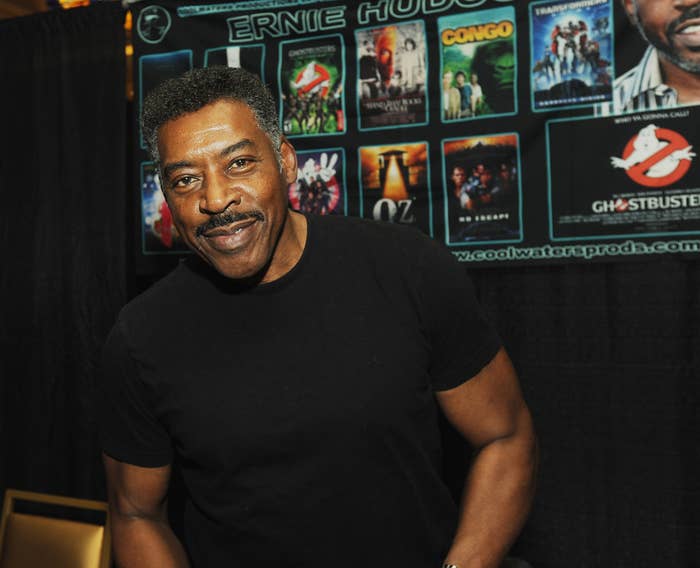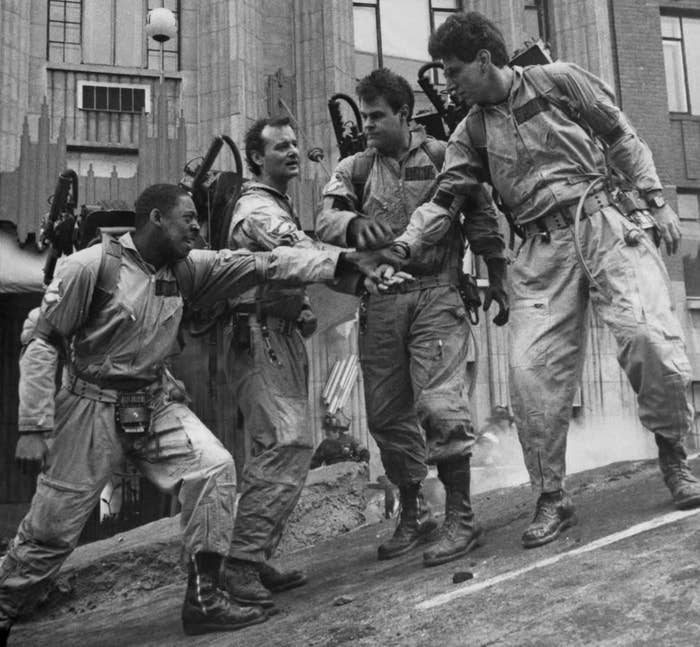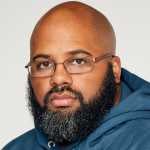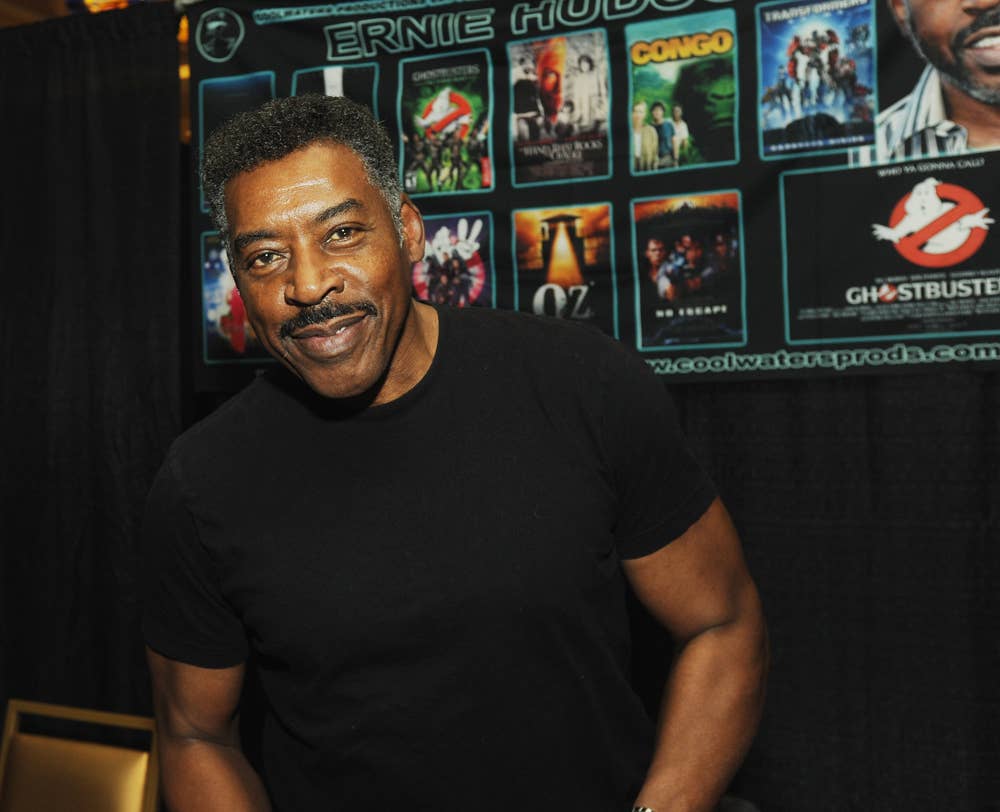
These days, it feels like there's a big anniversary for a TV show, movie, or pop culture moment happening every day. Some are more special than others, and some pop culture phenomenons are bigger than others. For example, June of 2019 not only marks the 35th anniversary of Ghostbusters, but also the 30th anniversary of its sequel, Ghostbusters II. The release of Ghostbusters was truly phenomenal. Its opening weekend haul ($13.6 million) and first-week haul ($23 million) set records at the time, and the film sat atop the box office for five consecutive weeks, only dropping to Prince's long-awaited smash Purple Rain. It ultimately became the highest-grossing film of 1984 (that is until Beverly Hills Cop came out in December). The film was so dope that it was re-released in theaters during the summer of 1985.
To mark this special occasion, Sony has issued a special 4K Ultra HD / Blu-ray release of both films in a limited edition steelbook, featuring more than two hours of rare archival footage, along with previously-unreleased delete scenes from the first Ghostbusters.
For me, as a young black kid being inundated with images of a green goblin with a large smile and four grown men chasing ghosts around New York City, I was always happy to see that one of them was a black guy. Ernie Hudson was that black guy, and while we were never given a full backstory on what his character Winston Zeddemore did before he became a Ghostbuster (or what he did when he wasn't busting ghosts), we can appreciate that he was involved in such a phenomenal moment, one that is a huge marker in his five decade long career.
Hudson recently phoned Complex to talk about the legacy of the Ghostbusters series, as well as share his opinion on why Winston wasn't given equal time compared to his crew, and reflect on some of his favorite roles in his storied career.
Your history with Ghostbusters is more interesting than most. How are your feelings about things like these, when these big 35 year anniversaries come about?
I'm first so very honored and proud to be a part of that whole franchise. You do a movie and you expect it to do well but you don't expect to be celebrating 35 years later. They sometimes will do things that feels a little less than inclusive, and I try to sort of stay positive and keep moving. For example, I saw something that came out and it had three Ghostbusters, some promotion for something. When I went back to the 30th anniversary, they asked me to come to Chicago and introduce the movie at a theater. But when I got there, there was a big poster of the three guys, and of course, I wasn't on it.
I'm so thankful that the fans embrace the movie and still love the movie. And it's nice to see how it's had an impact on people's lives, their kids. A lot of people shared the film with their kids when they were growing up, and now their kids are grown and they're sharing with their kids. So in that sense, it's great. And as an actor, I've done a lot of film and TV shows. It's nice to have one that fans still love. Those don't come along very often.
When you were first reading for the film, did you have any inkling that it was going to do what it did in terms of being a pop culture moment?
I think when I first read the movie, I thought, "Okay, this was definitely something special," and I knew that it would be, or I felt very strongly that it would be a hit, but a hit in movie terms is something that it opens number one at the box office, it'll hang around for a few weeks until the next big thing comes along and then we go onto something else. You know, this stuff is almost like fashion, it changes almost by the week.
So, when it came out number one and it played really strong over the summer, I wasn't too terribly surprised by it after seeing the movie. I just felt very, very strong about it. Of course, the Ray Parker, Jr. song was also very popular and pushing the movie. So it just kind of came together in a great way. I had no idea, I just could not imagine that 10 years after the fact I would be seeing people wearing Ghostbuster outfits and turning their cars into Ectomobiles and getting tattoos on their bodies. That was a bit of a surprise to me.
Then 15 years, I'm like, "Oh wow, it's been 15 years, and people are still..." and 20, and 25, and 30, and now 35 years later people are still excited about it. That's something that, I don't think anybody knew. And I've worked with Bill Murray, Dan Akroyd, Harold, and Ivan, they had all had big hits, but even [compared to] some of their most popular films, Ghostbusters has a whole different kind of resonance that I think that they would have to be surprised. I meet fans and they'll mention other movies I've done some 20, 25 years, 30 years ago. But Ghostbusters sort of has a special place.

For me, being a black boy and watching a film like Ghostbusters and being able to see a black character be in the mix, that's always been something that I've latched on to and loved about the films and your character in particular. Have you gotten that a lot from people over the years?
Yeah, I think Ghostbusters was a little bit of a change. It didn't feel like it at the time, but over the years I've gotten a lot of, not just black kids, but kids of color, Hispanic, whatever. Because, and a lot of those movies, especially during that time, we weren't included in a way and in some ways I think Winston was sort of put on the edge that he was still involved, and he was still there and he was still as solid as any of the other characters. And I think a lot of kids found a lot of hope in that. He is a character. When I was a kid, the black characters in any big adventure film usually died very shortly. You know what I mean? They were always kind of marginalized in the way that they were portrayed, or felt like they had to be a certain way in order for the other characters to be the real heroes. Winston was kind of an everyman, but not just kids of color. A lot of white kids would come up and say they identify so much with the Winston character, because Winston was an average guy, so it was funny that so many people chose him to identify with as opposed to the wacky scientists who were.
Five years ago, you wrote a piece about the changes that the script went through, for Winston specifically. Do you have any memories, or do you remember anything specific from those previous versions that you kind of wished had made it to the film?
Essentially, I have a conversation with Ivan Reitman—who produced and directed the movie—and Ivan says, "I don't know what you're talking about, that never happened," I'm like, "Ivan, you're talking to me, okay," and I don't want to argue about it. We all get older and we all have different memories. But what I will say about that film, Winston, he came into the movie early on, and I felt once they decided to bring him in halfway through the movie, which they did in the second movie as well, that made no sense to me. It was almost like, "we want to establish things before we bring you into it." So it was kind of disappointing because I was a single dad, and I really wanted this film to be the catalyst to a lot of wonderful things.
So that decision was a little bit difficult. Also, I think there was a back story that they had written, at the point he's introduced to the group and the way it was done, he basically just comes and says there's a steady paycheck, so we don't really ever know much about the character, and I think that would have helped. The other characters at some moment in the movie, we find out about them. We don't really find out much about Winston.
A lot of kids, when I would go to schools and talk to kids after the movie came out, they would always ask, "Where did Winston go?" Because he's there, but then he's not there. So does he have a family? Does he have children? We like the guy, but he's sort of one of those workers who come to work but you don't know anything about them, you know? And I thought we would address that in the second movie, but once again, I think they have the character open the movie, but then he disappears, and he's not there when the heroes are establishing themselves, fighting the ghosts in the courtroom. And so it was halfway through the movie they pull Winston, and I don't know. You're black, so you know what I'm about to say: I can blame everything in my life bad that's happened on being black. And of course, I'm old enough now to know better. So why that decision was made, I don't know.
I think if Eddie Murphy had played that role, being an established actor and star, it would have been a whole different level of involvement. But for whatever reason, I think Winston is popular with the fans almost in spite of some of the decisions that the studio made. That might seem a little harsh, I don't know.
I'm very happy to have been a part of it, and I will say this too, as I get older, the movie stands on its own just the way it was made. So I think things happen. The movie is the movie it should have been, but just from a personal standpoint, it would have been a little nicer if the studio had been a little bit more inclusive even on the promotion of the movie. All the posters had the three guys and not the fourth character. But the fans, I think the fans embraced the character.
Anyway, so you know, and I think as a result of that, not to want to dwell on a negative note, but the things that I thought would come out of the movie, it took a long time to see some things happen, I think because the character wasn't included in the rollout of the movie, the promotion of the movie. It didn't have that, what do I say? That jump that I had hoped for.
I hear you, although I will say that yours is a name that I still see. It was good to hear that you're in L.A.'s Finest, just seeing you out there shining. Given your filmography, are there any particular films or TV roles that you would say were your favorite?
Every time I work, I mean, I guess on some level they're all your babies, so to speak. The Hand That Rocks the Cradle, I really loved that character, but you love them for different reasons. Sometimes it's the experience. The Hand That Rocks the Cradle was a character that I almost didn't get because of Ghostbusters. I think they felt Ghostbusters was kind of a comedic role, and they saw me a certain way and they thought they needed some, I don't know what they thought they needed, but it took me a long time and a lot of screen tests to finally convince them that I could do the role. That was very personal.
The Crow, I knew Brandon Lee for a few years before we did the movie. I didn't know him really well, but he was a good friend of Miguel Ferrer's who I was doing a series up in Canada with and met him, and I'm very thankful to have gotten a chance to work with him. Congo was really very fun to do because, as an African American, so many of those African adventure films, they all seem to be centered around some white leader [or] hunter, so it was nice to be able to lead the safari and to play around a crew guy. In that role there were a lot of things I got a chance to play that I normally don't get a chance to play, so that was fun. Oz was very special but in a different way. I think it was a little weird being the warden, but there was a lot of things going on. It was kind of nice to hold the fort down even though I think a lot of the real meat of the show was with the convicts, which I knew that going in. I liked being just a part of that. The cast was really creative and the most fun to be.
If I look back, I don't think there's anything I've done that I can't go, "Well, you know, I really enjoyed this about it," or "I took it for this reason." Sometimes it holds up when it comes to in the final product up, and sometimes we do stuff and you kind of go, "Oh, man, that might not have been the smartest move."
I'm a working actor, and I've always been. I was working before I did Ghostbusters. Some people think Ghostbusters was the first movie, but it wasn't. I got into business to work, and that's what I've always done. I will say there is sometimes disappointments because you think it shouldn't have to be this way, but at the end of the day, I've been very blessed.

